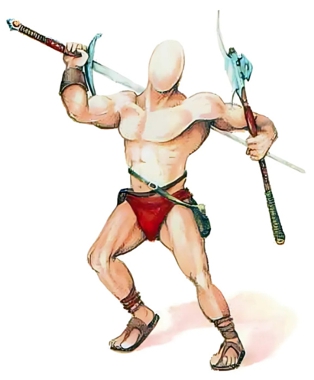Mujinas are magical creatures created to plague the human race. In their natural form, mujinas look like humans (of either sex) except that they have no faces. Where the eyes, nose, ears, and mouth should he, there is nothing; the face looks smooth as an eggshell. However, a mujina may create an illusion to give its face any appearance it desires.
These creatures speak Common and their own racial language, which consists of a series of oddly pitched hollow moans and howls – quite unpleasant to the ears of normal humans, demihumans, and humanoids.
Combat: The mujinas’ great strength (Strength 18/00) allows them to handle any two-handed melee weapon in one hand (except for a lance or polearm). They can attack with two weapons, one in each hand, with no penalties.
A mujina can cause its true face (a blank) to appear at will. Any creature with 5 or fewer Hit Dice or levels who sees the blank face becomes unnerved and automatically runs in fear for 1d3 rounds at top speed. Creatures with more than 5 Hit Dice or levels get a chance to resist the effect by making a saving throw vs. wands. The mujina’s true face can he revealed by a successful dispel magic as well; the spell’s target resists as an 8th-level spellcaster. Revealing the blank face in this manner still causes fear in observers.
Mujinas often surprise opponents, thanks to their disguise abilities. Also, they have special magical defenses against certain detection spells. If someone casts a detect evil or detect magic spell on a mujina, the creature gets a saving throw vs. spell; if successful, the mujina eludes detection.
Psionics, however, can spot a mujina mind easily, so members of this sinister race spend much time and effort killing psionically gifted individuals and collecting items that guard the mind. By the same token, mujinas try to lose or destroy magical items that can ruin their cover, such as medallions of ESP, or a gem of true seeing.
Habitat/Society: An unknown power created mujinas to bring trouble to the races of Mystara. Some priests call them a plague brought on by angry Immortals. These creatures, physically and emotionally identical to all others of their kind of the same gender, exhibit vicious hatred toward all species that have individual traits. They especially hate humans, the most diverse of all thc races on Mystara. The faceless creatures most commonly stay in large human cities, where they can blend in at will with little fuss.
Mujinas often pose as human hirelings, retainers, henchmen, and the like. One may serve faithfully for a long period, biding its time. It exercises an enormous amount of patience and self-restraint, waiting for the right time to attack and kill its companions.
However, not all mujinas are such cold-blooded killers; many simply want to rob people. Once again, a mujina waits for the right time; it prefers to strike while everyone sleeps, so victims will not realize they have been robbed until long after it has gone. Some mujinas take simple pleasure in frightening humans, especially lone travelers.
Mujinas have no society as humans define it. They sometimes travel together for mutual aid, but never stay together for more than a week if they can help it. On rare instances, several mujinas will hire on as a squad of mercenaries.
These asexual beings apparently do not reproduce. Many sages believe a malicious Immortal continually adds to the mujina population by cursing followers who never strive to stand out from the crowd, making them literally faceless.
Ecology: Some scholars have guessed at a possible link between mujinas and doppelgangers, citing similarities in methods of operation and attitudes.
Mujinas serve no useful purpose in local ecologies, unless one believes the dubious theory that they were placed on Mystara to trim the human population.


